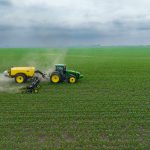Soil health is the cornerstone of a thriving farm ecosystem. However, prevalent farming techniques used in industrial crop production, such as synthetic fertilizer application and monocropping, can degrade soil over time. This degradation leads to a cascade of problems that necessitate the use of even more man-made inputs, which in turn contribute to climate change. Sustainable and regenerative agriculture aims to improve soil health, sequestering carbon, storing water, and building healthier farm ecosystems.
What Is Soil?
Soil forms the surface of the Earth and is composed of various mixtures of minerals, water, air, and organic material, including microbes and other organisms. Soil is not static; its composition changes based on the weather, the organisms within it, the plants that grow in it, and more. Soil, like air and water, is also vulnerable to pollution and can be damaged by industrial farming practices. However, soil can also be improved through sustainable practices, like applying compost.
The Impact of Industrial Agriculture on Soil Health
Industrial agriculture negatively affects soil health and the atmosphere by reducing organic matter and releasing carbon. Monocropping, the practice of growing the same crop on the same plot of land year after year, depletes the soil of nutrients, reduces organic matter in soil, and can cause significant erosion. Furthermore, the use of synthetic fertilizers and pesticides in industrial farming practices has been found to decrease soil’s microbiological diversity and cause soil acidification, which can affect plant growth.
The Benefits of Sustainable Agriculture for Soil Health
Sustainable agricultural techniques can help build healthy soil, avoiding the need for heavy synthetic fertilizer and pesticide use while protecting natural biodiversity in healthy soil. Some of the major benefits that sustainable agricultural practices have on soil health include improved carbon sequestration, improved water retention, less need for pesticides, and no need for synthetic fertilizer.
How Farmers Create Healthy Soils in Sustainable Systems
Regenerative farming techniques focus on building soil health through ecosystem-centered techniques, like composting and adding animals into their crop rotation practices. This contrasts with the industrial model, which strips soil of nutrients and results in a negative feedback loop that requires more and more inputs, like synthetic fertilizers, over time. Sustainable farmers use many different techniques to create and maintain healthy soil structure, rich in nutrients, in sustainable agricultural systems without the use of synthetic fertilizers or pesticides. These techniques include crop rotation, the use of compost, green manure, cover cropping and mulching, no-till or low-till techniques, limited to zero pesticide use and sustainable pest management techniques, such as using buffer zones and beneficial insects, and adding animals on pasture/animal manure to farm systems and crop rotation.
What You Can Do
Support farmers working to build healthy soils by shopping locally and buying organic products when you can. Educate yourself more about the benefits of sustainable crop production and the techniques farmers use to help build healthy soil.












